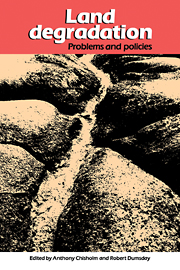Book contents
- Frontmatter
- Foreword
- Contents
- The Contributors
- Figures
- Tables
- Glossary
- Preface
- Land degradation and government
- I Physical and biological aspects of land degradation
- II Social costs
- III Legal, institutional and sociological factors
- IV Behavioural causes, economic issues and policy instruments
- V Pressure groups, public agencies and policy formulation
- VI Towards more effective policies for controlling land degradation: an overview
- A Rational approaches to environmental issues by Anthony Chisholm
- B Comments by Bruce Davidson
- C Comments by John Thomas
- D Participants at workshop on land degradation and public policy
- Bibliography
- Index
Land degradation and government
Published online by Cambridge University Press: 05 February 2012
- Frontmatter
- Foreword
- Contents
- The Contributors
- Figures
- Tables
- Glossary
- Preface
- Land degradation and government
- I Physical and biological aspects of land degradation
- II Social costs
- III Legal, institutional and sociological factors
- IV Behavioural causes, economic issues and policy instruments
- V Pressure groups, public agencies and policy formulation
- VI Towards more effective policies for controlling land degradation: an overview
- A Rational approaches to environmental issues by Anthony Chisholm
- B Comments by Bruce Davidson
- C Comments by John Thomas
- D Participants at workshop on land degradation and public policy
- Bibliography
- Index
Summary
In dealing with a complex multi-disciplinary issue such as land degradation there is often a tendency for scientists and researchers to concentrate on particular problems in isolation from the wider political and social context. This tendency reflects the nature of the work being undertaken and the need for specialisation if worthwhile advances are to be made. However, it does not hurt to step back occasionally and take a wider view.
I believe a minister is reasonably well placed to undertake such a task. The very nature of the job demands that the competing interests of various sectors of society are taken into account in decision making. Thus, it is possible to obtain a good appreciation of all aspects of a particular issue and come to an understanding of how effective or ineffective policy initiatives can be.
There are good reasons why government has become involved in the control of land degradation. There has been a realisation by society in recent years that land degradation is the most significant threat to the continued viability of rural industry in Australia. The justification for such a statement is not difficult. Various studies have indicated that over half the rural lands in Australia are experiencing a significant level of land degradation.
Statements of concern could undoubtedly apply to many of Australia's natural resources.
- Type
- Chapter
- Information
- Land DegradationProblems and Policies, pp. 1 - 4Publisher: Cambridge University PressPrint publication year: 1988

